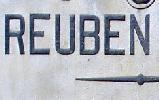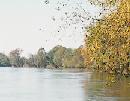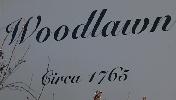 |
Bolling Hall Built before 1799.
Organized education for the deaf in
America had it's origins here when William Bolling brought Scottish teacher John
Braidwood in to teach his two deaf children. His success led to the
establishment of the nation's first formal school for deaf children. It is on the
Virginia Landmarks Register.
Photographed 16 Oct 2007 and Contributed by George Seitz |
 |
Brightly A Virginia Historic
Landmark and listed on the National
Register of Historic Places. It was built in 1842 by Dr. George Harris.
Photographed 16 Oct 2007 and Contributed by George Seitz |
 |
Byrd Presbyterian Church Built in
1838, it retains it's architectural
features, including the slate roof and interior window valances.
Photographed 17 Sep 2007 and Contributed by George Seitz. |
 |
County Courthouse The fourth to
serve the county and the second to
occupy the location. Erected in 1826 by Valentine Parrish and Dabney Cosby.
It is in temple form and has a Tuscan portico and entablature.
Photographed 17 Sep 2007 and Contributed by George Seitz. |
 |
Elk Hill A Greek Revival country
house built for Randolph Harrison, Jr.
Completed by 1839 on land formerly owned by Thomas Jefferson. It is on the
Virginia Landmarks Register.
Photographed 16 Oct 2007 and Contributed by George Seitz. |
 |
Rev. Reuben Ford Historic Marker
Photographed 3 Mar 2008 and Contributed by Paula Lucy Delosh |
 |
Hebron Presbyterian Church It has
served Manakin-Sabot since it's dedication
April 4th, 1846.
Photographed Jan 2007 and Contributed by George Seitz |
 |
James Clopton Knibb Building Also
called the 1906 House, it is part of
the courthouse complex and is a registered Virginia Historic Landmark.
Photographed 16 Oct 2007 and Contributed by George Seitz |
 |
Lock-Keeper's House A relic of
Virginia's bygone canal era. It was
built shortly after 1836 on the James River to serve lock number 7. Horses were
changed there, invoices checked and tolls collected. It also served as a
tavern for passengers and canalboat crews. It is on the Virginia Landmarks
Register.
Photographed Oct 16, 2007 and Contributed by |
 |
Mount Bernard The complex of 583
acres and 9 buildings was added to the
Virginia Landmarks Register in 2005. It has been known as Lightfoot's
Beaverdam Plantation and Kameschatka.
Photographed 16 Oct 2007 and Contributed by George Seitz |
 |
Perkins Baptist Church established
1853
Photographed 4 July 2007 and Contributed by George Seitz |
 |
Rock Castle On a high rock bluff
overlooking the James River. Built in
the 18th century, it was raided by Colonel Banastre Tarleton in 1781. It was
restored in 1935 and is one of the purest examples of traditional
18th-century Virginia architecture. It is on the Virginia Landmarks Register.
Photographed 16 Oct 2007 and Contributed by George Seitz |
 |
Tuckahoe A National Historic
Landmark and on the Virginia Landmarks
Register. A colonial plantation that stands on a bluff above the upper James
River. It is a H-shaped house that retains it's early masonry, woodwork, siding
and sash. It is perhaps Virginia's most complete and least altered early
plantation.
Photographed 11 Oct 2007 and Contributed by George Seitz. |
 |
Tuckahoe Schoolhouse The tiny
schoolhouse is where Thomas Jefferson is
said to have attended classes while he and his parents lived at Tuckahoe.
Photographed 11 Oct 2007 and Contributed by George Seitz. |
 |
Westview Landing On the James River.
This was a canal and railroad stop but is now a popular public boat landing, easily
recognized on the river by the "rock".
Photographed 1999 and Contributed by Gill Pollard |
 |
Woodlawn Built by Elisha Leake
near the end of the 18th century, in
1806 it was leased to John Trevillian who opened a tavern here. It is on the
Virginia Landmarks Register.
Photographed 16 Oct 2007 and Contributed by George Seitz. |
 |
Woodlawn Another view.
Photographed 3 Mar 2008 and Contributed by Paula Lucy Delosh |
 |
Woodlawn Sign at entrance.
Photographed 3 Mar 2008 and Contributed by Paula Lucy Delosh |
![]() Goochland County
Photo Album Index
Goochland County
Photo Album Index